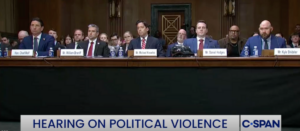In case you missed it, Concerned Women for America released an explainer about environmental, social, and governance scores, otherwise known as “ESG.” As we state in our explainer, “You have either heard of it, or you will, but the radical ideology known as ‘ESG’ is harming you.”
We know that the issue has the attention of the U.S. Congress. In what is likely a very small sample of what is to come, the House Financial Services Committee Chairman Patrick McHenry (R-North Carolina) formed an “ESG Working Group” of nine Members of Congress. On his way out, Senate Banking Committee Ranking Member Pat Toomey (R-Pennsylvania) published a report, “New Banking GOP Report Reveals How Asset Managers Use Proxy Voting Power to Advance Liberal Policies.”
The “E” in ESG—environmental—is most well thought out. ESG investors that push for “decarbonization,” for instance, demand not just disinvestment in energy but things that use energy—such as farming, especially dairy and meat cattle farming. The harms here are evident. What about the “S” and “G”? So far, this has looked like pro-abortion policies and “gender diversity” quotas on boards, and pressure on businesses to comply.
To better understand the issue, CWA spoke with Jerry Bowyer, a Christian financial economist, author, and columnist. Jerry is also host of the new podcast “Meeting of Minds,” author of “The Maker Versus the Takers,” contributor to WORLD News and the Christian Post, and a former columnist for Forbes.com.
He agreed to an interview to explain what ESG is and the problems it creates for America.
How would you summarize the problem with ESG? ESG is an approach to investing that brings politics—particularly left politics—and inserts it into the financial process. The problem is that we ought to make investment decisions based on financial criteria, not politics.
What institutions consider ESG? Managers for investment funds. Banks, which are ESG central. Public and private university endowments. Pension plans, especially in deep blue states.
Is this the cause for corporate wokeism, e.g., Walmart and Target? I would say corporate wokeism is a general social phenomenon of which ESG is a particular expression. ESG is wokeism from the standpoint of the investor. Some corporations do it on their own because they have an ideologically captured CEO, e.g., Salesforce or BlackRock. But often, it has to be pushed. ESG is one of the major pushes.
I would also call it a fad past due. The logic is, “this is the future so you should do it.” There have been lots of fads in finance. But this one is worse because it’s intertwined with politics in a way others have not been.
Can ESG be used to promote abortion policies? It is being used to promote abortion policies. For instance, asset managers will introduce and vote for shareholder resolutions that support abortion.
Another argument goes that investing in businesses in states that prohibit abortion are an investment risk. Of course, this is nonsensical. Just look at the population flow from the northeast [which tends to have no or weak protections for the unborn] to the south [which tends to have some or total protections for the unborn].
Could Christians be de-banked for having traditional views on marriage? Almost certainly if left unchecked.
Who are the relevant government officials? At the state level, the relevant officials are state treasurers and state attorneys general.
The treasurers are the Lexington and Concord minutemen of this fight. They didn’t sign up for the war but stepped up when the time came. Great examples are treasurers in Kentucky, Utah, West Virginia, Nebraska, Pennsylvania, and others with the State Financial Officers Foundation.
And attorneys general are starting to rev up. They saw people messing with their states; they’re fighting, and they’re winning.
At the federal level, the relevant actors are the U.S. Securities and Exchange Commission, the United States Department of Labor, and the Federal Reserve System and the United States Department of the Treasury to some degree.
Are there any “wins”? Costco just had a shareholder vote that was pro-abortion and that went down in flames, which you can learn more about here. The bubble is beginning to burst. Revolutionary ideologies can never get enough. Now, regular investors and liberals are finding out that the far Left cannot be appeased. I am glad conservative Christians are beginning to engage. For 30 years, there was a game we [conservative Christians] didn’t show up for. We lost by way of forfeit.
What are some action items? If you’re willing to do the work, if you’re an investor, stop throwing out proxies. If your financial advisor is in charge, you need to talk to them. Advisors need to feel the pressure from investors to vote their values.
Shareholders have power highly analogous to citizens in a republic. When you don’t like your government, do you never go to the polls again or do you vote them out?
States already have good laws. What will help is legislation that will more clearly and forcefully assert what is already the law—that assets will not be commandeered for political purposes.
You wrote a book, “The Maker Versus the Takers: What Jesus Really Said About Social Justice and Economics.” What did Jesus really say about social justice and economics? What He really said is that there is nothing immoral about wealth as long as it’s about producing wealth and not extracting wealth. He confronted the rich about wealth exclusively to individuals within the capital region. There are zero confrontations with entrepreneurs in Galilee. Every confrontation was with state actors—people who use their power to extract wealth from others.
We are grateful to Jerry for his time. What a unique moment for believers in the financial industry. If there is anything that the ESG phenomenon has revealed, it is a reminder that everything, including financial industry, is under the Lord’s domain.






